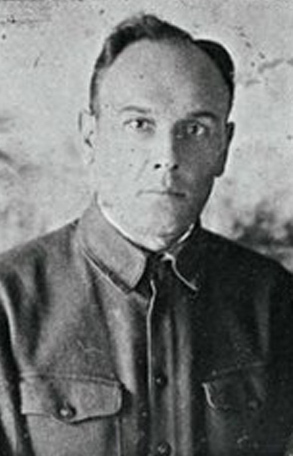Polishchuk, Klym
Polishchuk, Klym [Поліщук, Клим; Poliščuk; pseudonyms: Volyniak, K. Lavrynovych, Ivan Mecheslavenko, O. Cherednychenko, and others], b 25 November 1891 in Krasnopil, Zhytomyr county, Volhynia gubernia, d 3 November 1937 in Sandarmokh, Karelia region, RSFSR. Writer. He studied at the Saint Petersburg Academy of Arts (1909–12) and then worked for the Volhynia gubernial zemstvo. During the Revolution of 1917 he worked as an editor of Ukraïns’kyi holos (1917) and Narodnia volia and as a member of the editorial boards of Narodna sprava, the journal Mystetstvo, and other periodicals. In 1919 he joined the symbolist group Muzahet. In 1920 he moved to Galicia, where most of his works were published. He returned to Kyiv in 1925. Polishchuk was arrested in 1935 and imprisoned in the Solovets Islands in the White Sea, and later shot during the mass executions of political and other prisoners marking the twentieth anniversary of the October Revolution of 1917.
Polishchuk began writing poetry early in his life, and his first poems appeared without his knowledge in the paper Volyn’. He published his first story in 1909. In 1913 he published a collection of Ukrainian songs. Most of his short stories and his three novels are about the revolutionary years in Ukraine. Polishchuk was a prolific writer, with numerous collections of short stories, such as Daleki zori (Distant Stars, 1914), Sered mohyl i ruïn (Among Graves and Ruins, 1918), Tini mynuloho: Volyns'ki legendy (Shadows of the Past: Volhynian Legends, 1919), Vesele v sumnomu (The Joyful in the Sad, 1921), Zhmenia zemli: Halyts'ki legendy (A Handful of Earth: Galician Legends, 1921), Zoloti zerniatka (Golden Kernels, 1921), Skarby vikiv: Ukraïns'ki legendy (Treasures of the Ages: Ukrainian Legends, 1921), Anhel's'kyi lyst (The Angel’s Letter, 1923), and Zhertva (The Sacrifice, 1923). He also wrote the novels Otaman Zelenyi (1922), Svit chervonyi (The Red World, 1923), and Huliaipil's'kyi ‘bat'ko’ (The Huliai Pole ‘Father,’ 2 vols, 1925); the poetry collections Spivy v poliakh (Singing in the Fields, 1917), Poeziï (Poems, 1919), and Zvukolirnist' (Sound-Lyricalness, 1921); the drama Trivozhni [sic] dni (Turbulent Days, 1924); and memoirs about literary life in Kyiv in 1919, Z vyru revoliutsiï (From the Vortex of the Revolution, 1925).
Roman Senkus
[This article originally appeared in the Encyclopedia of Ukraine, vol. 4 (1993).]

